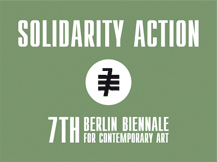Everyone has his own reasons for making or loving art. And the efficacy of an artistic practice with respect to a given society should be assessed very carefully, in the most specific way possible. Generic or structural discussion inevitably leads to a pseudo-scientific and intellectualist outlook, distorting reality. It is hard to say in what way or to what extent art can enter the political, social or ideological debate, otherwise we would not be talking about art. Not so much because it cannot influence politics (seen as activity in the public sphere), but because this does not happen in a direct or programmed way. Were we to think in terms of extremes, it would be easy to criticize, in this context, both those who pursue purely commercial ends and those who are blindly convinced that art can change the world. Often this is precisely the risk, namely that of triggering a dialectic that proceeds in terms of opposing extremes, accentuating the already existing split between the spheres and revealing the mutual dependence between power and antagonism. Maybe, to try to find a point of connection between these two opposites, we can use the famous phrase of Robert Filliou: “Art is what makes life more interesting than art”. Because, in effect, the positive thing we can expect from artistic practice is to be more concentrated on the dimension of (freely) living, rather than that of reproducing a given mechanism. In the whole of its relations between the individual and the public spheres, art should belong more to a way of being, or simply of not being useful, and not just to a way of doing and acting for a specific end. In this sense, art can have to do with – and to a certain extent influence – the political and social debate. But we would like to put particular emphasis on “can”, not in the sense of “is permitted to”, but in that of “does not necessarily have to”. To create a hierarchy of ethical and moral values with respect to art, even involuntarily, would be a bit like asserting that, for example, being a professional politician is in itself a better, more praiseworthy thing that being a high school literature teacher.
NERO
It is a quarterly magazine, publishing house and a curatorial project that produces events and exhibitions of contemporary art, books, catalogs and editions of artists. It is run by Francesco de Figueiredo, Luca Lo Pinto, Valerio Mannucci, Lorenzo Micheli-Gigotti and Nicola Pecoraro.


